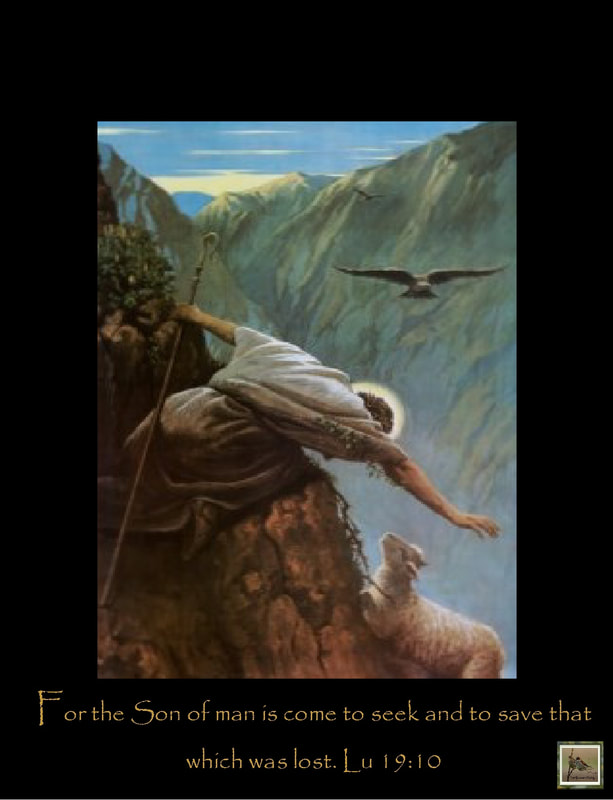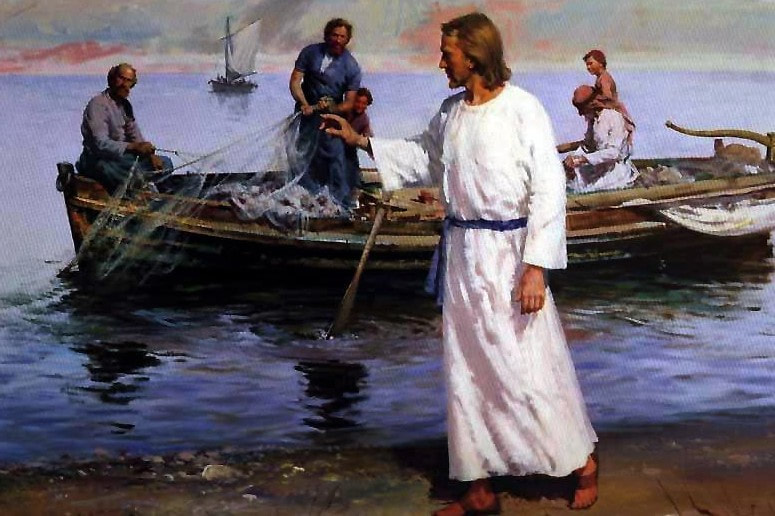Follow me. I saw thee — Joh_1:43-48
Joh 1:43 The day following Jesus would go forth into Galilee, and findeth Philip, and saith unto him, Follow me.
Joh 1:44 Now Philip was of Bethsaida, the city of Andrew and Peter.
Joh 1:45 Philip findeth Nathanael, and saith unto him, We have found him, of whom Moses in the law, and the prophets, did write, Jesus of Nazareth, the son of Joseph.
Joh 1:46 And Nathanael said unto him, Can there any good thing come out of Nazareth? Philip saith unto him, Come and see.
Joh 1:47 Jesus saw Nathanael coming to him, and saith of him, Behold an Israelite indeed, in whom is no guile!
Joh 1:48 Nathanael saith unto him, Whence knowest thou me? Jesus answered and said unto him, Before that Philip called thee, when thou wast under the fig tree, I saw thee.
Joh 1:44 Now Philip was of Bethsaida, the city of Andrew and Peter.
Joh 1:45 Philip findeth Nathanael, and saith unto him, We have found him, of whom Moses in the law, and the prophets, did write, Jesus of Nazareth, the son of Joseph.
Joh 1:46 And Nathanael said unto him, Can there any good thing come out of Nazareth? Philip saith unto him, Come and see.
Joh 1:47 Jesus saw Nathanael coming to him, and saith of him, Behold an Israelite indeed, in whom is no guile!
Joh 1:48 Nathanael saith unto him, Whence knowest thou me? Jesus answered and said unto him, Before that Philip called thee, when thou wast under the fig tree, I saw thee.
The Beginning of Changes
When a man has risen to great eminence, we are always interested in the story of his childhood. We listen eagerly to any scrap of information about his earliest days. And the deep interest that centers in these verses springs from the fact that here are the beginnings of fellowships and friendships that have changed the world. When we think of all that Christ was to be to John and of all that John was going to be to Christ; when we recall what the future had in store for Peter, we feel what great issues lay in these first meetings that are so simply and so quietly told. It is not often with any stir or uproar that the great moments come to men or women. They are not heralded with any sound of trumpet—the way of the Lord is not prepared like that. Quietly and unobtrusively two men follow Jesus, or a friend gives a word of welcome to a friend, or a brother goes and seeks out a brother—and from that hour all things shall be changed.
Christ Appeals to Different Natures
Note first to what different natures Jesus appeals. Four or five men are mentioned in our verses, and we know a little about the character of each. We know enough to convince us of the differences between the natures of these first disciples. Peter was eager and enthusiastic. John had a perfect genius for loving. Philip was slow, deliberative, cautious. Nathanael had a most unworldly and gentle heart. Yet all were drawn to the one Lord and Master and took their place in the ranks of the disciples. Some teachers appeal to certain kinds of men, or they attract those who are educated to one level; but it was one of the mysteries of Jesus that He drew to Himself such distinct and diverse men. Let the teacher of a class remember that. Let the mother lay it to heart among her children. Their natures are utterly different one from the other, yet all may find their friend in the one Lord.
Christ Appeals to Different Natures
Note first to what different natures Jesus appeals. Four or five men are mentioned in our verses, and we know a little about the character of each. We know enough to convince us of the differences between the natures of these first disciples. Peter was eager and enthusiastic. John had a perfect genius for loving. Philip was slow, deliberative, cautious. Nathanael had a most unworldly and gentle heart. Yet all were drawn to the one Lord and Master and took their place in the ranks of the disciples. Some teachers appeal to certain kinds of men, or they attract those who are educated to one level; but it was one of the mysteries of Jesus that He drew to Himself such distinct and diverse men. Let the teacher of a class remember that. Let the mother lay it to heart among her children. Their natures are utterly different one from the other, yet all may find their friend in the one Lord.
Christ Leads Men to Himself in Different Ways
Again, mark in what different ways men are led to Jesus. When Andrew and the other disciples followed Jesus, they did so because of the Baptist's word. Their days of companionship with John had made them ready to enter into the fellowship of Christ. Now John was the last and the greatest of the prophets; he closes and embodies the spirit of the Old Testament. These two, then, were the first of those many thousands who have been led through Psalm and prophesy to Christ. Then follows Peter, and his was a different avenue. It was his own brother who brought him to the Lord. So Peter is the first of that great company who have been brought to Christ by the influence of home. But it was not even a brother that brought Philip. It was the voice of Jesus saying, "Follow me." Philip is the leader of all who have yielded and been obedient to the Master because they have heard Him calling them. Last comes Nathanael, and it was Philip who brought Nathanael. There was old intimacy between the two. Nathanael is a type of everyone who is brought in by the influence of a friend. Do you note the diverse roads into Christ's presence? There are a thousand paths converging to that spot. They used to say that all roads led to Rome; perhaps it is truer that all roads lead to Christ. One highway rolls along through Psalm and prophecy; another is built on the prayer and the peace of home. One path would not be known save for the Shepherd's voice, and another lies through the meadowland of friendship. Of all these, we have God's foreshadowing in the coming of the first disciples.
Christ Deals with Newcomers by Different Methods
Again, remark by what different methods Jesus deals with newcomers. We can never note too earnestly or gratefully the value, in the eyes of Christ, of one. It was for one coin the woman swept the house. It was for one sheep the shepherd went seeking. It was for one son the father watched and prayed. Christ preached to vast audiences on many occasions, and a great crowd moved Him to compassion; but the woman of Samaria did not get poorer teaching because she formed an audience of one. The same thing strikes us in Jesus' dealing with newcomers. They are not dealt with on any scale of ten. Each stands apart and has a separate treatment, for each was precious in the eyes of Christ. One newcomer has his motives searched and sifted—that is the meaning of the sharp "What seek ye?" (Joh_1:38). Another is convinced that he is known— "Behold an Israelite indeed, in whom is no guile" (Joh_1:47). A third is summoned and strengthened by a word of command, "Follow me" (Joh_1:43). Let us not dream, then, that the Lord's way with us will be the same as His way with other people. Let us not despise our own peculiar welcome because no one else had ever quite the same. He knows us separately; separately He loves us; and every newcomer has his separate dealing.
The Kingdom Begins in Personal Acquaintance
Lastly, the Kingdom begins in personal acquaintance. Do you know how other societies are formed? They are formed by the drawing up of rules and statutes; and men are solemnly enrolled as officers, and everything is formal and exact. Here only, in quiet and simple ways, a Kingdom (though not of earth) is being founded, and it begins in acquaintance with the King. As it began so has it continued. The mark of citizenship is personal knowledge still. Strangers and aliens may say, "I know about Him." But the true citizen can say, "I know Him."
Christ Deals with Newcomers by Different Methods
Again, remark by what different methods Jesus deals with newcomers. We can never note too earnestly or gratefully the value, in the eyes of Christ, of one. It was for one coin the woman swept the house. It was for one sheep the shepherd went seeking. It was for one son the father watched and prayed. Christ preached to vast audiences on many occasions, and a great crowd moved Him to compassion; but the woman of Samaria did not get poorer teaching because she formed an audience of one. The same thing strikes us in Jesus' dealing with newcomers. They are not dealt with on any scale of ten. Each stands apart and has a separate treatment, for each was precious in the eyes of Christ. One newcomer has his motives searched and sifted—that is the meaning of the sharp "What seek ye?" (Joh_1:38). Another is convinced that he is known— "Behold an Israelite indeed, in whom is no guile" (Joh_1:47). A third is summoned and strengthened by a word of command, "Follow me" (Joh_1:43). Let us not dream, then, that the Lord's way with us will be the same as His way with other people. Let us not despise our own peculiar welcome because no one else had ever quite the same. He knows us separately; separately He loves us; and every newcomer has his separate dealing.
The Kingdom Begins in Personal Acquaintance
Lastly, the Kingdom begins in personal acquaintance. Do you know how other societies are formed? They are formed by the drawing up of rules and statutes; and men are solemnly enrolled as officers, and everything is formal and exact. Here only, in quiet and simple ways, a Kingdom (though not of earth) is being founded, and it begins in acquaintance with the King. As it began so has it continued. The mark of citizenship is personal knowledge still. Strangers and aliens may say, "I know about Him." But the true citizen can say, "I know Him."









